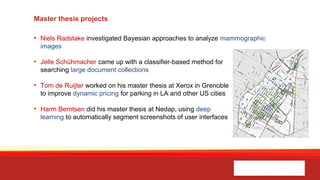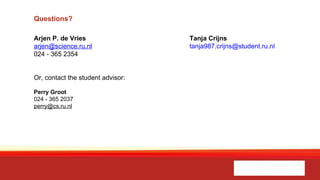Data Science Master Specialisation
- 1. Data Science Master Specialisation Arjen P. de Vries and Tanja Crijns
- 3. Scientific Questions • What is clustering? • What is causality? • What’s the magic behind deep learning? • How can you efficiently search and rank? • How do you build reliable models from complex data?
- 4. Why are these questions important? To help and improve our society
- 5. iCIS data science groups • Prof. Tom Heskes machine learning theory and applications • Prof. Elena Marchiori complex networks and machine learning • Prof. Arjen P. de Vries information retrieval and large-scale databases • Prof. Mireille Hildebrandt privacy and legacy aspects of data mining
- 6. But also… • Prof. Nico Karssemeijer (RadboudUMC) computer-aided diagnosis and medical imaging • Prof. Antal van den Bosch (Faculty of Arts) machine learning and language technology • Prof. Lutgarde Buydens (Institute for Molecules and Materials) chemometrics • Prof. Bert Kappen (Donders Institute) machine learning and stochastic control
- 7. Course outline 1st semester Track Basis Track Basis Track Choice Track Choice Free Choice 2nd semester Track Basis Research Seminar Track Choice Track Choice Free Choice 3rd semester Research Project CS & Society External Choice External choice 4th semester Master Thesis
- 8. Track basis courses Mandatory, key methodological aspects: •Machine Learning in Practice (6 ec) •Information Retrieval (6 ec) •Bayesian Networks (6 ec) Mandatory background: •Philosophy and Ethics for Computing and Information Science (3 ec) •Research Seminar Data Science (6ec) Responsible Data ScienceResponsible Data Science Deep dive into researchDeep dive into research
- 9. Track choice courses • Statistical Machine Learning (6 ec) • Natural Computing (6 ec) Theory and Tools • Machine Learning (9 ec) • Intelligent Systems in Medical Imaging (6 ec) • Computational Cognitive Neuroscience (6 ec) • Pattern Recognition for Natural Sciences (3 ec) Applications • Text Mining (6 ec) • Cognitive Computational Modeling of Language and Web Interaction (6 ec) • Comparative Genomics (3ec) • (Automatic) Speech Recognition (6 ec) • Law in Cyberspace (6 ec) • Foundations of Information Systems (6 ec) Other aspects • Business Rules Specification and Application (3 ec)
- 10. • Join one of the research groups within iCIS/RU or do an internship at a company - How to improve product suggestions based on global sentiments? - Which clients of the Belastingdienst have a high risk of non-compliance? - Can you predict penalty-free prepayment of mortgages? - How to find micro-calcifications in breast mammography images? - Can you predict the number of solar panels in a specific region? Research projects
- 11. Master thesis projects • Niels Radstake investigated Bayesian approaches to analyze mammographic images • Jelle Schühmacher came up with a classifier-based method for searching large document collections • Tom de Ruijter worked on his master thesis at Xerox in Grenoble to improve dynamic pricing for parking in LA and other US cities • Harm Berntsen did his master thesis at Nedap, using deep learning to automatically segment screenshots of user interfaces
- 12. Master thesis projects • Tim Janssen developed novel methods for predicting the workforce needed in retail stores • Bas van Berkel made clever use of Wikipedia to build a system for automatically translating words • Steven Reitsma applied deep learning to visual question answering • Harmen Prins investigated the use of word embeddings for ontology matching • Farhad Zanjani improved convolutional neural networks for semantic video integration
- 13. Data Science vs Web and Language Interaction • Overlap: text mining, information retrieval, machine learning in practice, ... • Data Science: broader scope of application domains, more emphasis on methodological aspects • Web and Language Interaction: dive deeper into the psychological and neurological aspects of human-human and human-computer interaction • “Process school” vs. “product school” view on AI • Can do both through a joint, double master program: 180 ec (3 years) for 2 master degrees!
- 15. Archive Otto-Lilienthal-Museum / www.lilienthal-museum.de
- 16. Job perspective • Start your own company in data analytics, become a data analysis specialist or consultant at a larger company, or go for a PhD Steven Reitsma Data Scientist at Big Data Republic Bas van Berkel Data Scientist at Achmea Kristel Rösken Business analyst at VVV Nederland Harmen Prins Big Data Specialist at Deloitte Alex Slatman Director at OBI4wanFarhad Zanjani PhD student at TU/e Tom de Ruijter Data Scientist at MeteoConsult Niklas Weber Data Scientist at Booking.com
- 17. Why Data Science at the Radboud University? • Diversity: various aspects and applications of data science • Flexibility: large choice of courses to shape student interests • Excellence: students are embedded in research groups
- 18. Admission requirements •A Bachelor’s diploma in - Computing Science - Artificial Intelligence - Related studies (Science, Physics, Math, ...), possibly with a few additional courses •Specific pre-master’s for students with a diploma from the university of applied sciences (HBO) •Fluency in both written and spoken English •Check out with our student advisor for details or in case of doubt
- 20. Why did I choose Data Science • Background - Artificial Intelligence BSc • Data Science related courses - Data mining - Neural networks • Bachelor thesis on text categorization - Assigning one of 10 categories to an event based on a description Music? Dance? Theater? Movie?
- 21. Example: Text Mining Different areas of text mining: •Text categorization •Summarization •Sentiment analysis •Question answering •Topic modeling
- 22. Example: Intelligent Systems in Medical Imaging • Basic methods of image processing work • The role of machine learning in medical imaging • Apply Deep Learning • Implement and evaluate a system for a clinical application
- 23. Example: Machine Learning in Practice • Participate in 2 machine learning challenges - Groups of 5 • The Nature Conservancy Fisheries Monitoring - Classify species of fish • Work with actual data distributed by companies and organizations • Real prize pool
- 24. My impressions • Is it fun? • Is it difficult? • What do you like the most about it? • For questions about my experience with courses or anything else; come find me afterwards! Yes! Sometimes! That I’m developing a set of hard skills that are useful in the academic world ánd the industry
- 25. Questions? Arjen P. de Vries Tanja Crijns arjen@science.ru.nl tanja987.crijns@student.ru.nl 024 - 365 2354 Or, contact the student advisor: Perry Groot 024 - 365 2037 perry@cs.ru.nl
Editor's Notes
- flxone: data driven advertising; obi4wan: social media monitoring

























